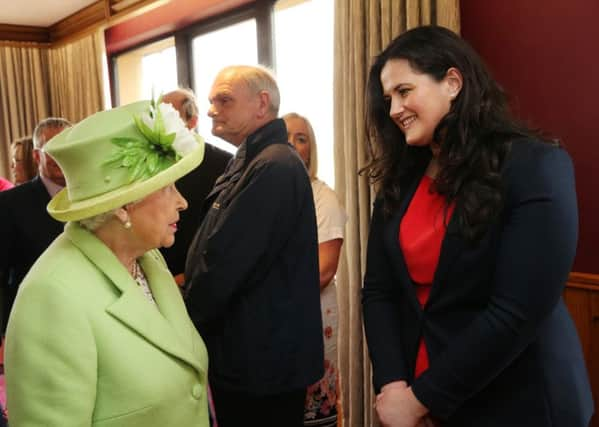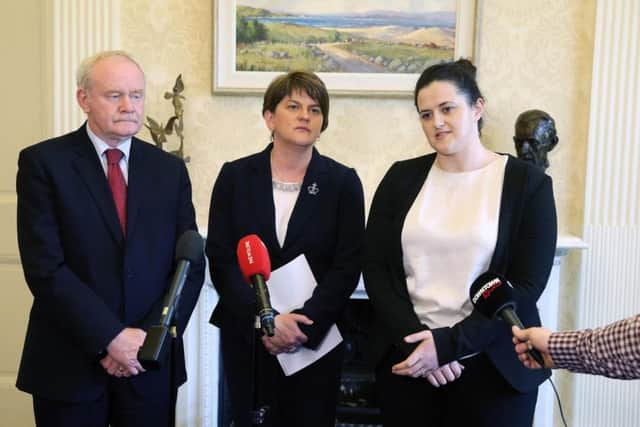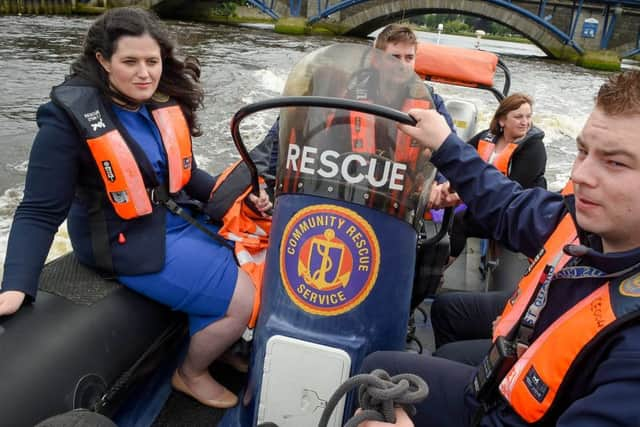Justice minister: Three years ago I wasn't sure I wanted to be politician


Alex Kane: When you were appointed as Justice Minister a very senior Opposition MLA told me that you were ‘just a patsy to get Foster and McGuinness out of a hole’. What has your experience of them been like: and how have you found the Executive?
Claire Sugden: I can genuinely say that there does seem to be a willingness to move forward together.
Advertisement
Hide AdAdvertisement
Hide AdMaybe it’s because Arlene has won her first mandate as leader and Martin is looking towards the end of his term of office, but I sense that they both want to make progress with Northern Ireland... we have a great working relationship and I do have regular meetings with them to discuss what may come up and how it will affect the wider Executive.


AK: You’ve never been a minister before and you’ve been critical in the past about how the Executive has operated; but as an ‘insider’ now, do you think the dynamics are positive?
CS: Yes. What I see is ministers talking across the table with each other and also having side-meetings to discuss policy which is inter-departmental.
I’m not sure if that happened before, but talking to people who would have more experience with these things, they tell me that there is a different feel about this Executive.
Advertisement
Hide AdAdvertisement
Hide AdAK: Between 2007-16 it was common for observers like myself to write about the dysfunctional nature of the Executive. You seem to be saying that the climate and interaction is very positive?


CS: In my two years as a backbench MLA my perspective of what was happening inside the Executive is entirely different from what I’m seeing now, as a minister. Yes, there’s still a culture there, because it’s still a coalition government with lots of disagreements – including my own take on issues, as an independent.
But we still have to find that balance between a healthy clash of views and the need to come together as an Executive to get the best for Northern Ireland. And I think we’re doing that.
AK: Did anybody try and put pressure on you by saying something like; “It all comes down to you now, Claire, if you don’t take this job there will be no Executive and the whole process could be at risk of collapse?”
Advertisement
Hide AdAdvertisement
Hide AdCS: To be fair, no. But I was politically astute enough to know that that was probably the case....I’d already been on quite a journey; most of it unexpected and unplanned.


To be honest, I’m not even sure that becoming an elected politician was even an aspiration just three years ago. I tried to take stock over the summer about what has happened. But I’m still not sure how I’m supposed to feel about it all.
AK: I think you must have had one of the most incredible leaps in recent British political history: winning your first election (as an independent with no party machine) and then accepting a post which is regarded as one of the most difficult political jobs.
CS: Obviously it was never part of my political strategy or gameplan to win a seat with the expectation of an Executive ministry. That’s not how the system works for independents...
Advertisement
Hide AdAdvertisement
Hide AdAfter speaking with Martin and Arlene about the job I spoke to a number of others.


My biggest fear was what my constituents would think about me taking it.
So I talked to constituents and asked them if they thought I would be regarded as a patsy or find myself just stuck in the middle; but most of them told me to go for it and take the opportunity I was being offered.
Many of them wanted a voice from East Londonderry at the centre of politics and the heart of government. And that’s what decided me.
Advertisement
Hide AdAdvertisement
Hide AdAK: Your life is now completely different, with Close Protection Units (CPU), potential threats, loss of privacy and so on. What sort of impact has that had on your family, friends and on your fiancé, Andy?
CS: Perhaps at this stage it’s still quite novel. I quite like it, actually, although perhaps I shouldn’t say that.
I’ve been an independent for two years and I’ve been used to being by myself and walking into rooms and meetings by myself.
Everything was on me and I didn’t have a big support structure.
Advertisement
Hide AdAdvertisement
Hide AdSo it’s quite nice now, even from a practical level, to have that support.
Living an hour-and-a-half from Stormont I save three hours a day when I can work en route rather than driving.
And that means that I can get papers done and have more time to spend with Andy when I do get back home in the evening.
AK: How is Andy taking it all? You’ve only just got engaged so it must have been a bit of a shock for him?
Advertisement
Hide AdAdvertisement
Hide AdCS: He has his own career and his own stresses and he very much enjoys what he does. But thankfully he doesn’t come home at night and call me minister.
He keeps my feet firmly on the ground.
My becoming minister is not about the CPU or the title: I’ve always been a down to earth person and the point of me taking the job was to represent all of the people of Northern Ireland, so I don’t put myself or see myself as higher than anyone else. To be honest I’m quite bashful about all of this.
AK: On the day your appointment was confirmed in the Assembly you got quite a lot of stick from UUP, SDLP, Alliance quarters – parties with which you’d have had a good relationship when you sat in the ‘naughty corner.’ Did that hurt? Did it surprise you?
CS: I was as entitled to the role as anyone else in the Assembly. That was my immediate reaction – because the nature of how the justice minister is appointed means that it could have been any one of a number of other people.
Advertisement
Hide AdAdvertisement
Hide AdAnd I wasn’t hurt by the comments because the purpose of the Assembly is to hold the Executive to account, so I wasn’t surprised, either.
AK: Your dad was a Prison Officer. Does that have any impact on how you deal with the prisons’ issue? Do you come to the job with a preconceived view?
CS: For dad it was a job and a way for providing for his family. Yes, he came into the house and he talked about his role; but that was normal for us, so it didn’t occur to me that it was anything other than normal when I was growing up.
I suppose now, understanding the prison service and the challenges faced within it, I am very sympathetic to Prison Officers.
Advertisement
Hide AdAdvertisement
Hide AdThey do a very difficult job, they work in a unique environment, they have a job like no other; and I’m very mindful of that as we move forward.
I’ve seen the outworking of how it affects Prison Officers and over the next five years I want to look at that and I want to make sure that we support them better, not just for their own sakes, but also for the sake of the people they’re looking after within custody.
But I’m keen to listen, even when that means that I won’t be able to give people what they want in every circumstance.
I may have to take hard decisions that impact upon me electorally, but that doesn’t matter to me. I made peace with myself that when I accepted this job I’m doing it on the basis of doing a good job over the next five years and that may mean not getting elected again – and if that’s the case, well, I’ll look for something else.
Advertisement
Hide AdAdvertisement
Hide AdAK: Do you ever think there’ll be a definition of victim which would be acceptable to all sides? Could you, personally, come up with such a definition? And isn’t there a danger that the ongoing failure to get that definition and deal with other legacy issues will stop you from being able to focus on broader issues?
CS: Truthfully, I don’t know. When I talk about victims I’m talking about people who believe themselves to be victims. People whose families may have been caught up in the Troubles, or they themselves may have been directly caught up.
Who am I to say how people should feel? If people feel that they have been affected by this in some way and that they need to get some sort of closure – although that’s not the right word, because sometimes you can never get closure – but they have to get some sort of acknowledgment, perhaps, of what has happened to them. I’m respectful. I want to listen to that.
But there are constraints; quite practical constraints of what the definition of a victim is and we have to be honest about that and what it means.
Advertisement
Hide AdAdvertisement
Hide AdThere are people who have gone through such severe atrocity in their life, but who do not want to be defined as a victim.
AK: But how do you cope with the different groups telling you different things, or saying. “We are victims, but they aren’t”?
CS: I listen. I think it’s really critical that we listen in these circumstances and so I have spent the past four months listening to people who feel themselves to be victims.
And not one of them is telling me that their pain is greater than anyone else’s, that’s the interesting thing.
Advertisement
Hide AdAdvertisement
Hide AdHad I not been prepared or briefed before meeting these people their stories are all the same; they’ve all been hurt, they’ve all gone through some sort of trauma and I think that’s the kind of critical aspect of this – that we need to extend a hand to them as the government and say that we are prepared to acknowledge and help with this.
AK: So less of a specific definition and more of an acknowledgment that whatever they think of the others, at least they themselves have been recognised and acknowledged?
CS: Yes. As I said, in terms of being a minister I’m not going to sit here and tell people how they should feel. But what I am keen to do is try and help them move forward.
AK: At the time the report on Loughinisland was published and the word ‘collusion’ was used, you didn’t challenge the use of the word in the Assembly. Jim Allister said of you: “I’m disappointed, but not surprised. I suppose she would not have been appointed if she was going to rock the Sinn Fein boat.” How do you respond to that?
Advertisement
Hide AdAdvertisement
Hide AdCS: Just because Jim Allister disagrees with me does not mean that I am not keen to rock the Sinn Fein/DUP boat... just because something is popular in a newspaper doesn’t mean that it is the right thing to do or say.
AK: When the new blueprint for dealing with paramilitaries was published David Ford, your predecessor, said that he wouldn’t have supported it because it was, “weak and aspirational.” You supported it. Why?
CS: Yes, I fully support it and I’m leading on it. But while I’m surprised by David’s response I do think that it was an easy thing for him to say.
My immediate response to the blueprint was that we should not have a expected a fully costed and detailed plan at that stage...
Advertisement
Hide AdAdvertisement
Hide AdIt’s easy to say ‘there’s no detail and what are they going to do,’ but should it really have been expected to be more than what it was, particularly with the timeframe we were working to?
AK: What’s your reaction to those who say that the legacy issues are being ignored to suit the interests of the DUP and SF and that they’ll never get justice?
CS: They are not being ignored... I’m more than committed to moving on legacy and there’s two aspects to that, the legacy inquests and the HIU. Ideally I’d like to see those move in tandem with one another and if that is the case I think that would be the best possible outcome.
AK: You were very supportive of John McCallister’s Opposition Bill. How do you think Opposition is faring?
Advertisement
Hide AdAdvertisement
Hide AdCS: It’s early days and they need a chance; but so far it’s not been very effective. If I was a leader of an Opposition party I’d be appointing people to focus on key issues and drill down on those issues.
They need to understand policy, understand legislation, understand scrutiny, understand the system and understand the opportunities they have as an Official Opposition. For two parties which sat in government from 2007 onwards they don’t really seem to understand how government works.
AK: Do you have a sense of something which I’ll call the ‘Claire Sugden Vision’ – a broad plan about the difference you could make to Northern Ireland?
CS: Yes. And that’s what really, really excites me... That’s why I’m surrounding myself with people who have a broader view of the world outside the normal political bubble.
Advertisement
Hide AdAdvertisement
Hide AdMy special adviser, for example, had a former role in the corporate sector as a ‘change manager’.
AK: A few days before you were appointed you said that you didn’t have a wish list. Do you have one now?
CS: I just want to do what I think is right for the people of Northern Ireland.
I didn’t come to the job with party policy and baggage.
I’m coming in with the issues that people face every day and I want to address those in some way...
Advertisement
Hide AdAdvertisement
Hide AdSo I want my executive colleagues to respect me enough to keep me in the picture and not to put up barriers.
I want them to be mindful of the sacrifice I made to try and save Northern Ireland and to save the Executive – because the last thing I would have wanted was for the process to collapse.